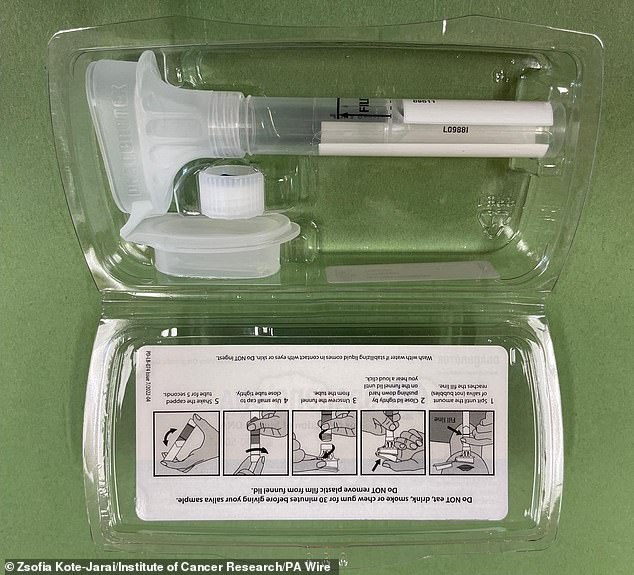A new at-home spit test for prostate cancer is more accurate than current screening methods, a breakthrough study suggests.
Researchers say the test is so effective it could ‘turn the tide’ on the disease and help identify at-risk men without the need for a GP appointment.
They estimate it could find 12,350 tumours at an earlier stage, when the disease is easier to treat, saving the NHS £500million a year.
The development is a major boost to the Mail’s campaign for a national prostate cancer screening programme, aimed at preventing needless deaths.
Prostate cancer is the most diagnosed form of cancer in England, with around 55,000 cases and 10,200 deaths each year.
The test involves extracting DNA from a saliva sample and looking for variations that are known to increase a man’s risk of prostate cancer.
The type and number of variations allows scientists to calculate each individual’s risk, known as a polygenic risk score (PGS).
Those with a high PGS can then be offered an MRI scan and biopsy to establish if they actually have a tumour.

Brothers Joel Turnbull and Dheeresh Turnbull both found out they had prostate cancer after they took part in a trial assessing the spit test for prostate cancer

A new at-home spit test for prostate cancer is more accurate than current screening methods, a breakthrough study suggests
New trial results show the spit test outperformed the blood test currently used on the NHS to look for elevated levels of prostate-specific antigen (PSA).
For the men with the highest genetic risk, the spit test picked up a higher proportion of aggressive cancers, returned fewer false positives, and picked up people with cancer who would have been missed by the PSA test.
Researchers at The Institute of Cancer Research, London, and The Royal Marsden NHS Foundation Trust found the test also identified men with prostate cancer that was missed by an MRI scan.
Professor Ros Eeles, from the ICR, said: ‘With this test, it could be possible to turn the tide on prostate cancer.
‘We have shown that a relatively simple, inexpensive spit test to identify men of European heritage at higher risk due to their genetic makeup is an effective tool to catch prostate cancer early.
‘Building on decades of research into the genetic markers of prostate cancer, our study shows that the theory does work in practice – we can identify men at risk of aggressive cancers who need further tests and spare the men who are at lower risk from unnecessary treatments.’
The Barcode 1 study, published Wednesday in the New England Journal of Medicine, calculated the PRS of 6,142 European men aged 55 to 69.
The score is based on 130 genetic variations in the DNA code that are linked to prostate cancer, developed by studying the DNA of hundreds of thousands of men.

New trial results show the spit test outperformed the blood test currently used on the NHS to look for elevated levels of prostate-specific antigen (PSA)

The development is a major boost to the Mail’s campaign for a national prostate cancer screening programme, aimed at preventing needless deaths
Those with the highest 10 per cent of risk scores were invited to further screening.
Typically, only 25 per cent of men with a high PSA level will actually have prostate cancer.
But following an MRI and prostate biopsy, 187 (40 per cent) of the 468 men with a high PRS were diagnosed with the disease.
Of these 187 men, 118 (63.1 per cent) had a PSA level below 3.0ug/L, which is considered ‘normal’ and would usually indicate that no further screening is required.
Previous studies have shown that the PSA blood test picks up many people who have cancers that are not of concern and would not require treatment.
The PRS saliva test identified a higher proportion of aggressive cancers – which are fast growing and likely to spread – than the PSA test.
Of the 187 cancers detected, 55.1 per cent were aggressive cancers compared with 35.5 per cent identified by a PSA test in a recent study.
The PRS test is also more accurate than an MRI scan for these men with high genetic risk, as 125 men (66.8 per cent) had prostate cancer confirmed by a biopsy that was not detected by the MRI.
A £42million trial launched by the charity Prostate Cancer UK will directly compare the saliva test to the PSA blood test and MRI scan, to assess whether those with a low genetic risk may also benefit from an alternative screening tool.
Professor Kristian Helin, chief executive of ICR, said: ‘Early detection of cancers significantly increases the chance of a cure.
‘With prostate cancer cases expected to double by 2040, it’s crucial to establish a robust way of picking up clinically significant cases of prostate cancer at an earlier stage.
‘The current PSA test often leads to unnecessary treatments and, more concerningly, fails to detect some cancers.
‘There is an urgent need for a better screening test.
‘This research represents a promising advancement towards that goal and underscores the life-saving potential of genetic testing.’







